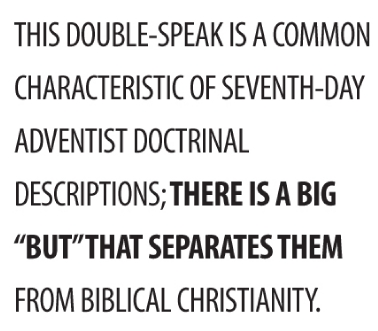Fundamental Belief #13: The universal church is composed of all who truly believe in Christ, but in the last days, a time of widespread apostasy, a remnant has been called out to keep the commandments of God and the faith of Jesus. This remnant announces the arrival of the judgment hour, proclaims salvation through Christ, and heralds the approach of His second advent. This proclamation is symbolized by the three angels of Revelation 14; it coincides with the work of judgment in heaven and results in a work of repentance and reform on earth. Every believer is called to have a personal part in this worldwide witness.

Once again, the casual reader who is unfamiliar with Adventism isn’t likely to grasp all that is meant by this statement. There are meanings buried beneath this belief statement that are explained in Adventist literature to which the average Christian would have little access; therefore, the real meaning of this fundamental belief would be unlikely to be examined by the Evangelical Christian community. While Adventists have invented many fancy dodges to the question, “What is the remnant church?”, the simple truth is that the official teaching of Adventism is that the Remnant Church is, both historically and currently, the Seventh-day Adventist Church.
The baptismal vows in the official Adventist church manual confirm this internal understanding:
13. Do you accept and believe that the Seventh-day Adventist Church is the remnant church of Bible prophecy and that people of every nation, race, and language are invited and accepted into its fellowship? Do you desire to be a member of this local congregation of the world church?1
Also from the Seventh-day Adventist church manual:
28. In accordance with God’s uniform dealing with mankind, warning them of coming events that will vitally affect their destiny, He has sent forth a proclamation of the approaching return of Christ. This preparatory message is symbolized by the three angels’ messages of Revelation 14, and meets its fulfillment in the great Second Advent Movement today. This has brought forth the remnant, or Seventh-day Adventist Church, keeping the commandments of God and the faith of Jesus. (Amos 3:7; Matt. 24:29-34; Rev. 14:6-10; Zeph. 3:13; Micah 4:7, 8; Rev. 14:12; Isa. 26:2; Rev. 22:14.)2
Fundamental Belief #13 begins with truth: “The universal church is composed of all who truly believe in Christ,” and then it inserts a qualifier that negates this truth, “but in the last days”. This double-speak is a common characteristic of Seventh-day Adventist doctrinal descriptions; there is a big “but” that separates them from biblical Christianity. In reality, there is no such thing as a remnant church that is unique and distinguished from the universal church.
Rev. 14:17 says, “So the dragon was enraged with the woman, and went off to make war with the rest (remnant) of her children, who keep the commandments of God and hold to the testimony of Jesus.”
This symbolic woman first gave birth to Jesus, and He is the only child of this woman mentioned in the chapter. The rest (or remnant) of her children are all of the adopted children of God. For the Adventist church to claim to be the rest of her children is a direct denial of the universal church.
Furthermore, according to Scripture it is not this remnant who announce the judgment hour, but an angel. Nothing in the scriptural passage of Revelation 14 suggests that these angels are symbolic of a church. Interestingly, Seventh-day Adventists do not consider any other angels in the book of Revelation to be symbolic of a church. In fact, nothing links these angels to the remnant, nor is there anything in Revelation 14 indicating the believers are called to join the angels in making this proclamation. The idea, therefore, that “Every believer is called to have a personal part in this worldwide witness” is not supported by the passage.
The notion that the proclamation of this message corresponds to a work of judgment going on in heaven is yet another extra-biblical insertion into the belief statement.
The notion that the proclamation of this message corresponds to a work of judgment going on in heaven is yet another extra-biblical insertion into the belief statement. The proclamation in Revelation 14 is that judgment has come, not that it is in the process of taking place in heaven. Moreover, the language used by the angels in Revelation 14 is the same as the language used in chapter 18. The sole reason that Adventists link Revelation 14:7 with the idea of a judgment that is in the process of taking place in heaven is that they use this passage to validate their investigative judgment doctrine. This idea, however, is simply not found in the words of the passage. Moreover, the judgment in Revelation 14:7 is a judgment of the wicked. The investigative judgment of Adventism is a judgment of professed believers.
In summary, this fundamental belief is not founded on sola scriptura. Adventists have skewed the meanings of the words of the Bible to validate their unique, unbiblical doctrines. Consequently, Fundamental Belief #13 clarifies the underlying Adventist meaning of Fundamental Belief #12. Taken together, these belief statements reveal many extra-biblical ideas that are camouflaged by “evangelical wording” but which actually describe unique doctrines that are completely unsupported by the biblical passages they cite.
Endnotes
- Prayers for Spiritual Unity Answered! - March 20, 2025
- Our Journey Out of Adventism - July 27, 2023
- 30. Adventism’s New Earth - July 27, 2023
